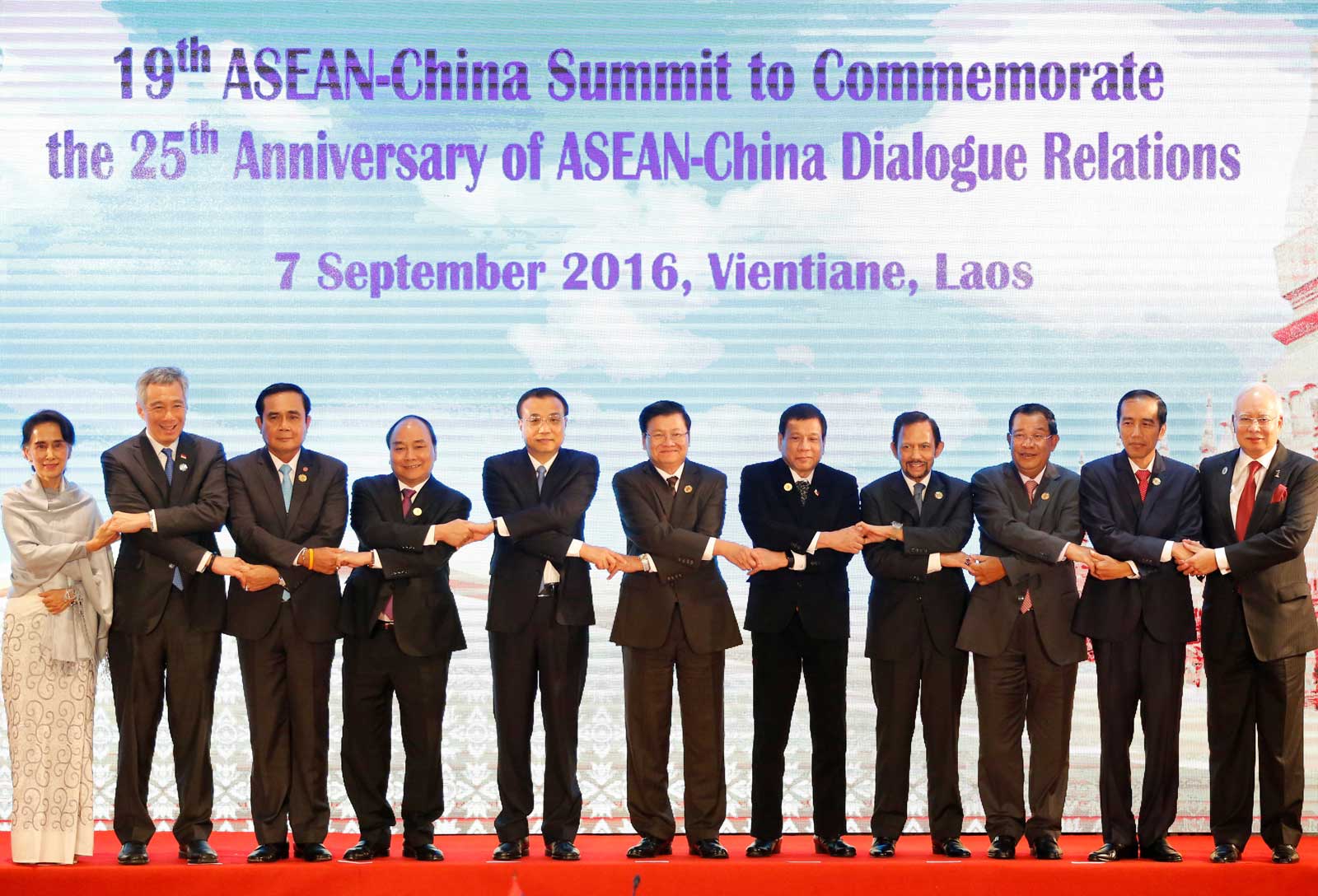VIENTIANE – Asian leaders played down tensions over the South China Sea in a carefully worded summit statement on Thursday, but even before it was issued Beijing voiced frustration with countries outside the region”interfering” in tussles over the strategic waterway.
The heads of 10 Southeast Asian nations, as well as US President Barack Obama and Chinese Premier Li Keqiang among six other leaders, “reaffirmed the importance of maintaining peace, stability, security and freedom of navigation in and over-flight in the South China Sea”.
But the draft of a statement to be issued in Vientiane, Laos, tiptoed around the regional strains caused by competing claims to areas of the strategically important sea.
“Several leaders remained seriously concerned over recent developments in the South China Sea,” said the draft.
The statement, seen by Reuters, made no reference to a July ruling by a court in The Hague that declared illegal some of China’s artificial islands in the sea and invalidated its claims to almost the entire waterway.
Obama said on Thursday the ruling had helped clarify maritime rights. “I recognise this raises tensions but I also look forward to discussing how we can constructively move forward together to lower tensions,” he said at a summit meeting.
Officials said that talks on Wednesday between leaders of the Association of Southeast Asian Nations (ASEAN) and China’s Li had gone smoothly.
But in a statement later from China’s Foreign Ministry, Li was paraphrased as saying China was willing to work with Southeast Asian countries in “dispelling interference … and properly handling the South China Sea issue”.
He did not elaborate, but such wording is typically used by Chinese leaders to refer to not allowing countries from outside the region with no direct involvement in the dispute, like the United States, from getting involved.
China claims much of the South China Sea, through which more than $5 trillion of trade moves annually. Taiwan and four ASEAN members – Vietnam, the Philippines, Malaysia and Brunei – also have claims, making it a hot spot of regional tension.
The other ASEAN nations are Cambodia, Indonesia, Laos, Myanmar, Singapore and Thailand. Leaders from Australia, China, India, Japan, New Zealand, Russia, South Korea and the United States also attended the summit.
China has over the past year alarmed other claimants, and outside powers such as the United States and Japan, by re-claiming land on several disputed reefs through dredging, and building air fields and port facilities.
Shattering an illusion of cordiality at the summit in Laos on Wednesday, US ally the Philippines released photographs and a map showing what it said was an increased number of Chinese vessels near the disputed Scarborough Shoal, which China seized after a standoff in 2012.
Its defence ministry expressed “grave concern” that Chinese boats were preparing to build structures at the shoal.
CLEARED THE AIR
The Philippines’ move came after a dispute with the United States, its former colonial power. Ties turned frosty when new President Rodrigo Duterte insulted US counterpart Barack Obama on Monday, prompting the cancellation of a meeting between them.
The two leaders made some steps towards clearing the air late on Wednesday, however, chatting briefly, and exchanging pleasantries as they prepared to take their seats at a leaders’dinner.
The United States has been a staunch ally of the Philippines and China has repeatedly blamed Washington for stirring up trouble in the South China Sea.
Washington says it has no position on the territorial disputes but wants to ensure freedom of navigation. To press that point, it has conducted patrols near Chinese-held islands.
Although the Scarborough Shoal is merely a few rocks poking above the sea, it is important to the Philippines because of the fish stocks in the area. Manila says China’s blockade of the shoal is a violation of international law.
The dispute has become more significant since the Permanent Court of Arbitration ruled in July that no country had sovereign rights over activity at Scarborough Shoal. China has refused to recognise the ruling by the court in The Hague.
Li made no direct mention of Scarborough Shoal in the comments provided by the foreign ministry, but Beijing said on Wednesday there had been no new activity there and “some people”were spreading information that was “hyping the situation”.
China’s embassy in Manila said there has been no dredging or building at the shoal and China has maintained a coastguard presence there for law enforcement patrols.
A statement by ASEAN on Wednesday listed eight points related to the South China Sea, but made no mention of the arbitration ruling.
The bloc traditionally shies away from taking a position on thorny diplomatic issues, especially where China is concerned, because of its influence in the region and the need to balance ties with the United States. “Both China and the United States are among the most important partners of ASEAN, and ASEAN does not want to have to choose between those partners,” the secretary general of the bloc, Le Luong Minh, told Reuters in an interview on Thursday.































































































